译林牛津版高中英语模块7 Unit 3 The world online Reading The effects of the Internet on our lives课件 (共33张)
文档属性
| 名称 | 译林牛津版高中英语模块7 Unit 3 The world online Reading The effects of the Internet on our lives课件 (共33张) | 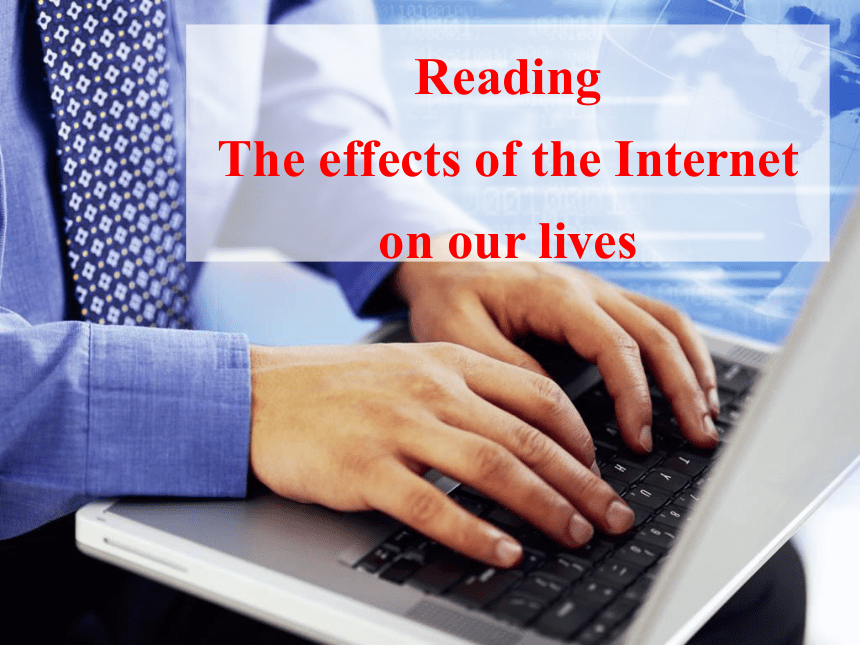 | |
| 格式 | zip | ||
| 文件大小 | 431.2KB | ||
| 资源类型 | 教案 | ||
| 版本资源 | 牛津译林版 | ||
| 科目 | 英语 | ||
| 更新时间 | 2019-06-06 09:18:31 | ||
图片预览

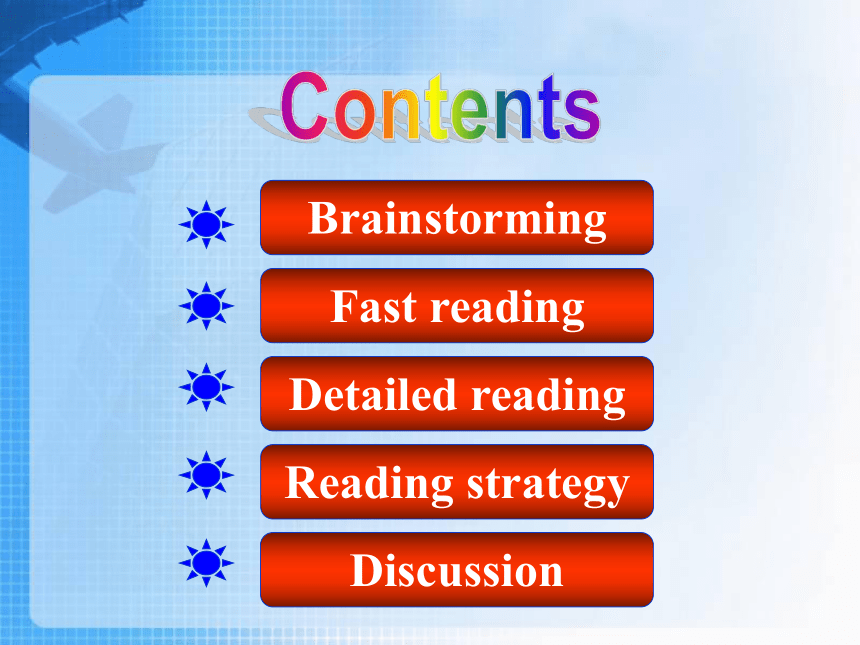

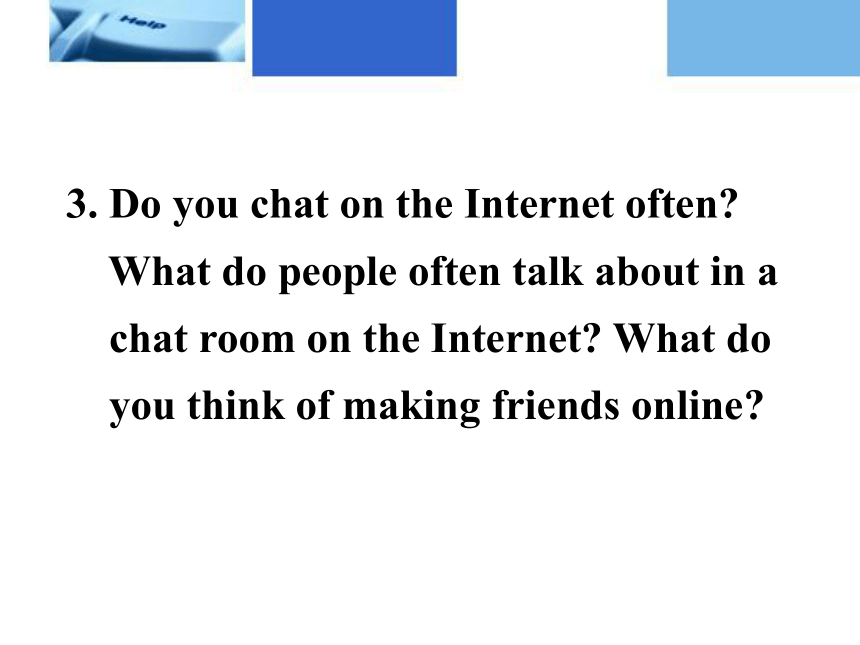
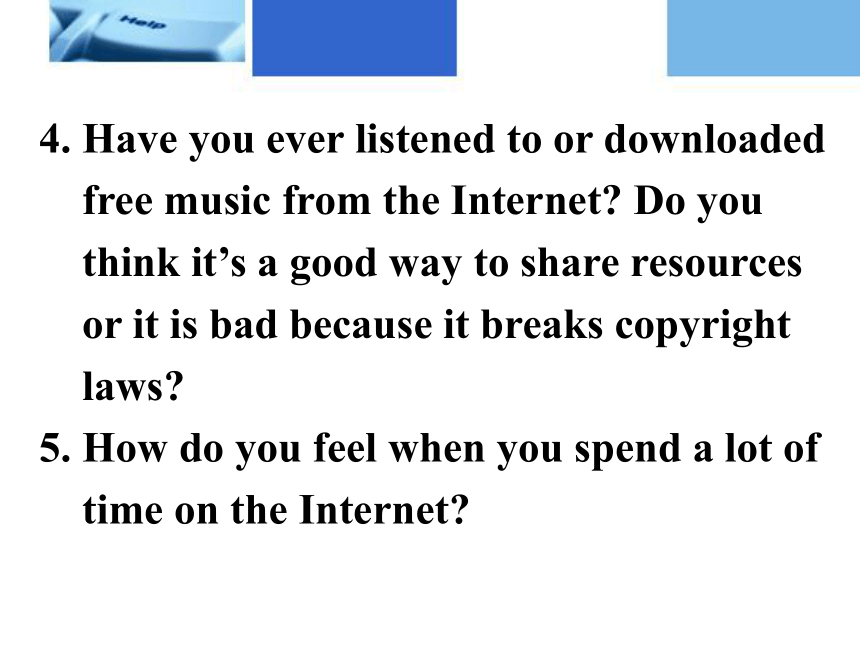
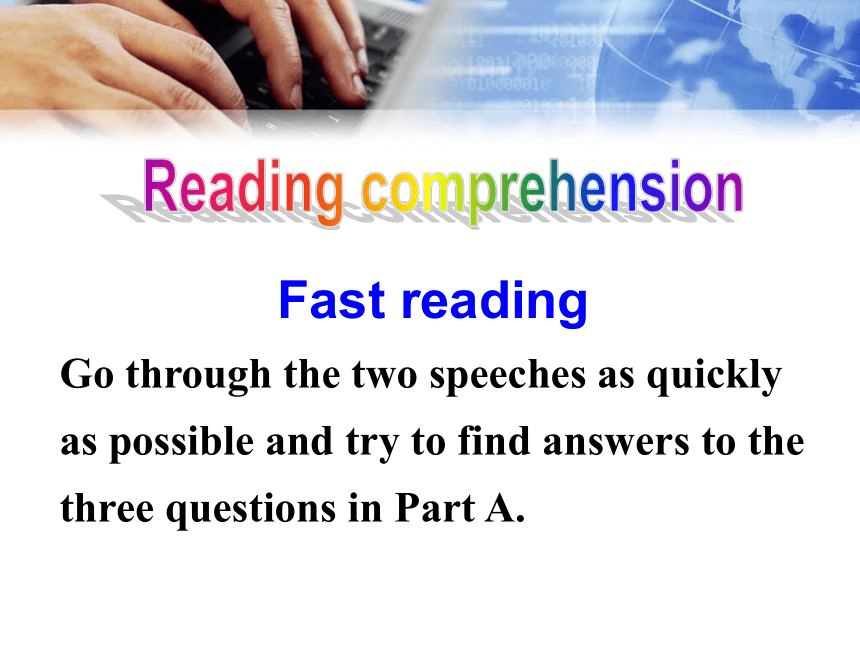
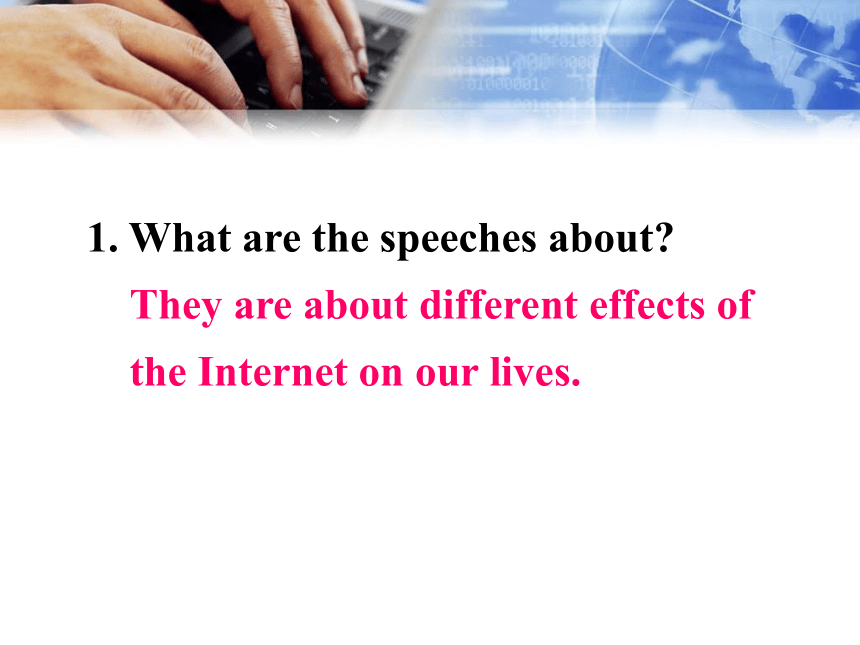
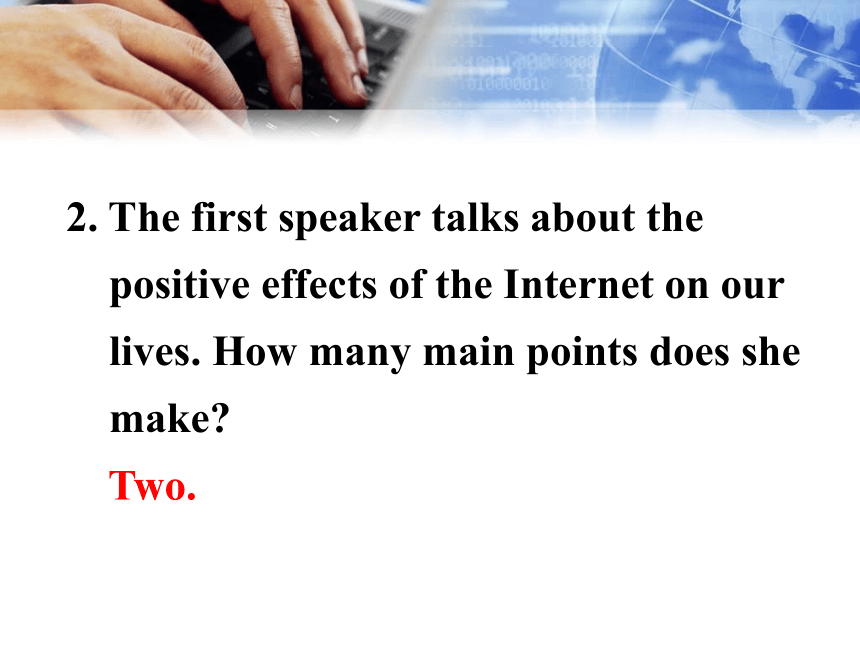
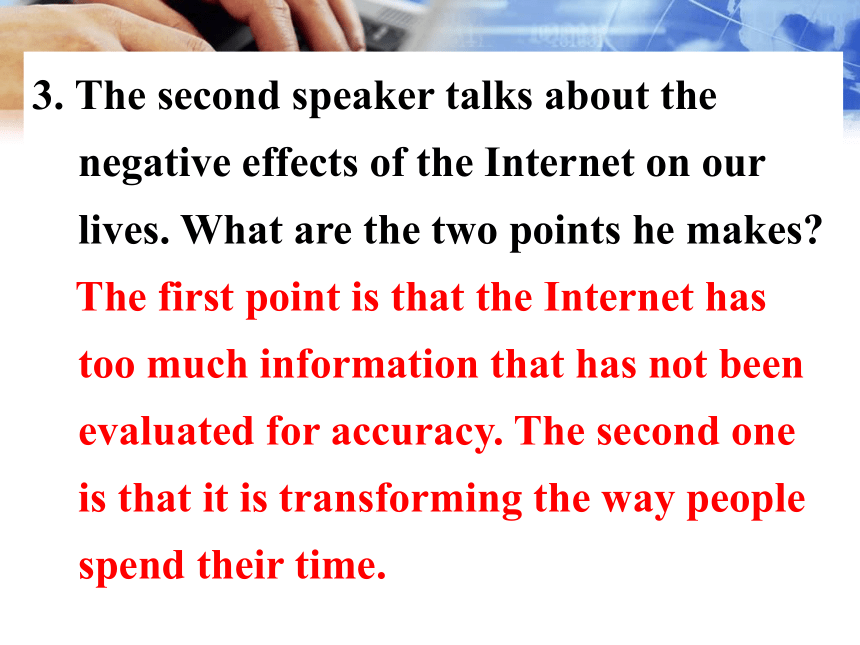
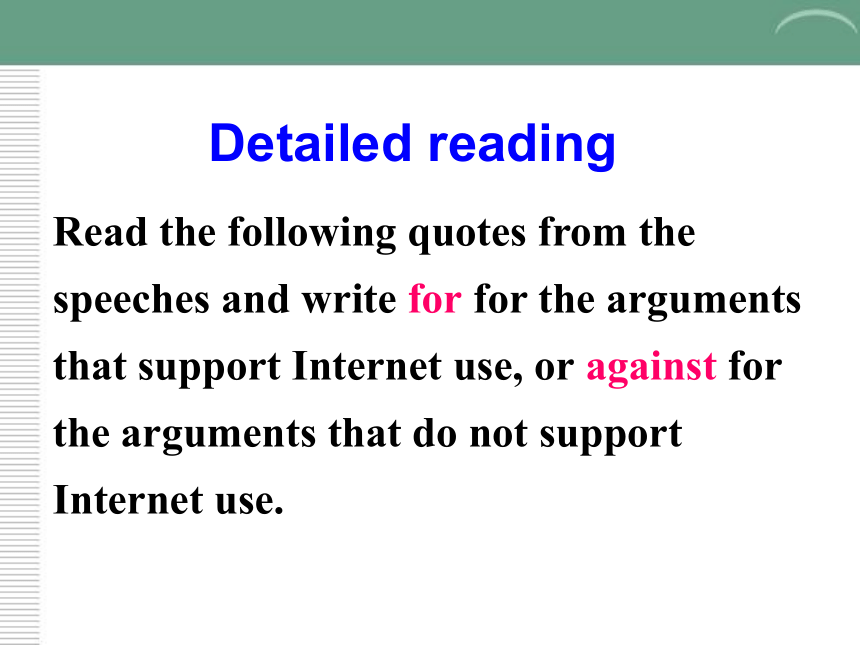

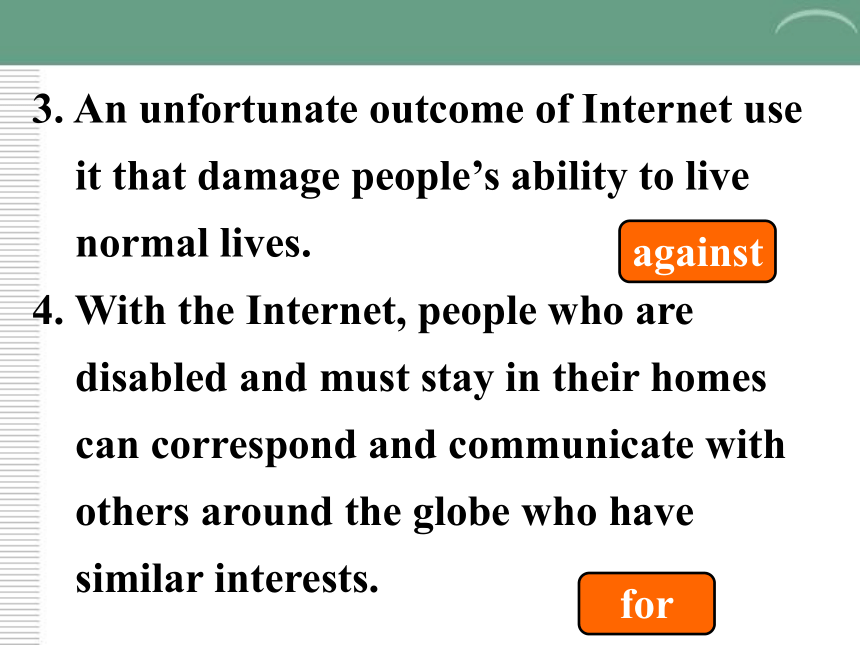
文档简介
课件33张PPT。Reading
The effects of the Internet
on our livesContentsBrainstormingReading strategyDetailed readingFast readingDiscussion1.Do you use the Internet? What do
you often do on the Internet?
2. How do you search for the
information you want?Brainstorming3. Do you chat on the Internet often?
What do people often talk about in a
chat room on the Internet? What do
you think of making friends online?4. Have you ever listened to or downloaded
free music from the Internet? Do you
think it’s a good way to share resources
or it is bad because it breaks copyright
laws?
5. How do you feel when you spend a lot of
time on the Internet?Fast reading
Go through the two speeches as quickly as possible and try to find answers to the three questions in Part A.Reading comprehension1. What are the speeches about?
They are about different effects of the Internet on our lives.2. The first speaker talks about the
positive effects of the Internet on our
lives. How many main points does she
make?
Two. 3. The second speaker talks about the negative effects of the Internet on our lives. What are the two points he makes?
The first point is that the Internet has too much information that has not been evaluated for accuracy. The second one is that it is transforming the way people spend their time.Detailed reading Read the following quotes from the speeches and write for for the arguments that support Internet use, or against for the arguments that do not support Internet use.1. We cannot always tell if the
information on the Internet is true.
2. Of regular Internet users, 80 per cent
employ it mostly to search for
answers to questions.againstfor3. An unfortunate outcome of Internet use
it that damage people’s ability to live
normal lives.
4. With the Internet, people who are
disabled and must stay in their homes
can correspond and communicate with
others around the globe who have
similar interests.againstfor5. One of the greatest benefits of Internet
friendships is that they are based on
common interests, rather than
appearance or age.
6. This study shows that people who spend
too much time on the Internet tend to
withdraw from the world round them.againstforRead the facts below, and write down the argument each fact supports.Gathering information is the primary use for the Internet.People use the Internet to build social bonds.The huge amount of false information on the Internet becomes more of a problem every day.Spending too much time building relationships on the Internet can damage people’s abilities to live normal lives.Match the new words with the
correct meanings.
1 abundant ____
2 assumption ____
3 avenue _____ 4 evaluate_____
5 accuracy _____ 6 false _____
7 withdraw _____bagcfdea a belief that something is true or will
happen
b more than enough
c the state of being exact or correct
d not correct or true
e pull away from
f from an opinion of the amount, value
or quality of something
g a possible way of doing something Suggest answers of Part E:
1. ___________ 2. _____________
3. ___________ 4. _____________
5. ___________ 6. _____________
7. ___________weaknessesdiversebondsaddressedclickcorrespondstatistics1. Children use the Internet mostly to
_____.
A. chat B. play games
C. help with their studies
D. advance knowledge about hobbies Test yourself2. What is the most important thing in building a friendship?
A. common interests B. appearance
C. age D. popularity 3. What is the worst problem of eBay?
A. false information
B. people don’t know how to use a
computer
C. things selling on the Internet don’t
exist
D. people are used to the traditional
ways of buying 4. The clinic was opened to_________.
A. help people surf the Internet
B. be an Internet café
C. make people spend their time with
their family
D. help people who are addicted to
computer gamesReading strategy: reading an argumentWhen you read an argument, you must remember that a specific view is being given. The first thing you will read is a
statement of what the argument is
about. After that, you will usually
find a list of the points the person
wants to make.Another thing you will often find in an argument is a statement about what the other side believes, and why the debater does not agree.
At the end of the argument, you will find the conclusion. In this section, there is often a summary of the argument.Usage of reading strategyRead the passage again and point out which sentences are about the two speakers’ views, which sentences are the supporting facts the two speakers give, and which sentences are their conclusions.Work in groups. Two members in each group represent Zhu Fei and the other two represent Li Lei. Read the debate, you can make some changes or add your own opinions to the debate.Role-playDiscussion1. Do you think that people can find true
friendship on the Internet? Why or why
not?
2. How much time do you think a student
should spend on the Internet every day?3. Some people do not tell the truth about
themselves on the Internet. Do you think
people should be worried about this?
Why or why not?
The effects of the Internet
on our livesContentsBrainstormingReading strategyDetailed readingFast readingDiscussion1.Do you use the Internet? What do
you often do on the Internet?
2. How do you search for the
information you want?Brainstorming3. Do you chat on the Internet often?
What do people often talk about in a
chat room on the Internet? What do
you think of making friends online?4. Have you ever listened to or downloaded
free music from the Internet? Do you
think it’s a good way to share resources
or it is bad because it breaks copyright
laws?
5. How do you feel when you spend a lot of
time on the Internet?Fast reading
Go through the two speeches as quickly as possible and try to find answers to the three questions in Part A.Reading comprehension1. What are the speeches about?
They are about different effects of the Internet on our lives.2. The first speaker talks about the
positive effects of the Internet on our
lives. How many main points does she
make?
Two. 3. The second speaker talks about the negative effects of the Internet on our lives. What are the two points he makes?
The first point is that the Internet has too much information that has not been evaluated for accuracy. The second one is that it is transforming the way people spend their time.Detailed reading Read the following quotes from the speeches and write for for the arguments that support Internet use, or against for the arguments that do not support Internet use.1. We cannot always tell if the
information on the Internet is true.
2. Of regular Internet users, 80 per cent
employ it mostly to search for
answers to questions.againstfor3. An unfortunate outcome of Internet use
it that damage people’s ability to live
normal lives.
4. With the Internet, people who are
disabled and must stay in their homes
can correspond and communicate with
others around the globe who have
similar interests.againstfor5. One of the greatest benefits of Internet
friendships is that they are based on
common interests, rather than
appearance or age.
6. This study shows that people who spend
too much time on the Internet tend to
withdraw from the world round them.againstforRead the facts below, and write down the argument each fact supports.Gathering information is the primary use for the Internet.People use the Internet to build social bonds.The huge amount of false information on the Internet becomes more of a problem every day.Spending too much time building relationships on the Internet can damage people’s abilities to live normal lives.Match the new words with the
correct meanings.
1 abundant ____
2 assumption ____
3 avenue _____ 4 evaluate_____
5 accuracy _____ 6 false _____
7 withdraw _____bagcfdea a belief that something is true or will
happen
b more than enough
c the state of being exact or correct
d not correct or true
e pull away from
f from an opinion of the amount, value
or quality of something
g a possible way of doing something Suggest answers of Part E:
1. ___________ 2. _____________
3. ___________ 4. _____________
5. ___________ 6. _____________
7. ___________weaknessesdiversebondsaddressedclickcorrespondstatistics1. Children use the Internet mostly to
_____.
A. chat B. play games
C. help with their studies
D. advance knowledge about hobbies Test yourself2. What is the most important thing in building a friendship?
A. common interests B. appearance
C. age D. popularity 3. What is the worst problem of eBay?
A. false information
B. people don’t know how to use a
computer
C. things selling on the Internet don’t
exist
D. people are used to the traditional
ways of buying 4. The clinic was opened to_________.
A. help people surf the Internet
B. be an Internet café
C. make people spend their time with
their family
D. help people who are addicted to
computer gamesReading strategy: reading an argumentWhen you read an argument, you must remember that a specific view is being given. The first thing you will read is a
statement of what the argument is
about. After that, you will usually
find a list of the points the person
wants to make.Another thing you will often find in an argument is a statement about what the other side believes, and why the debater does not agree.
At the end of the argument, you will find the conclusion. In this section, there is often a summary of the argument.Usage of reading strategyRead the passage again and point out which sentences are about the two speakers’ views, which sentences are the supporting facts the two speakers give, and which sentences are their conclusions.Work in groups. Two members in each group represent Zhu Fei and the other two represent Li Lei. Read the debate, you can make some changes or add your own opinions to the debate.Role-playDiscussion1. Do you think that people can find true
friendship on the Internet? Why or why
not?
2. How much time do you think a student
should spend on the Internet every day?3. Some people do not tell the truth about
themselves on the Internet. Do you think
people should be worried about this?
Why or why not?
